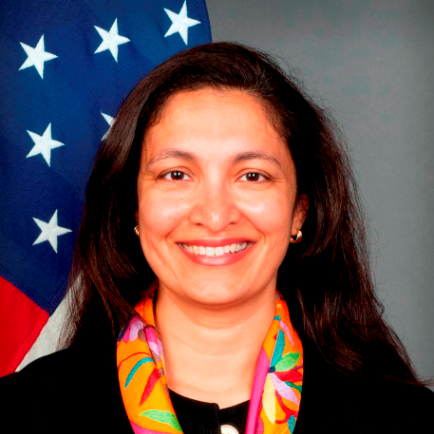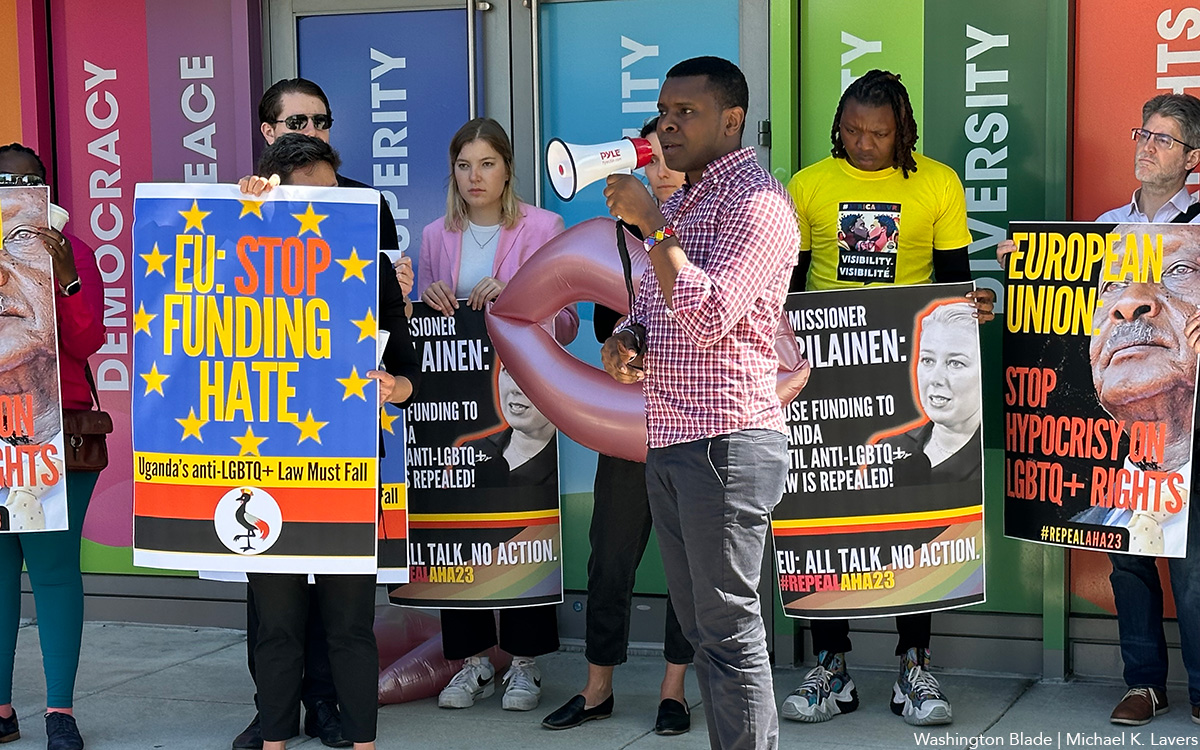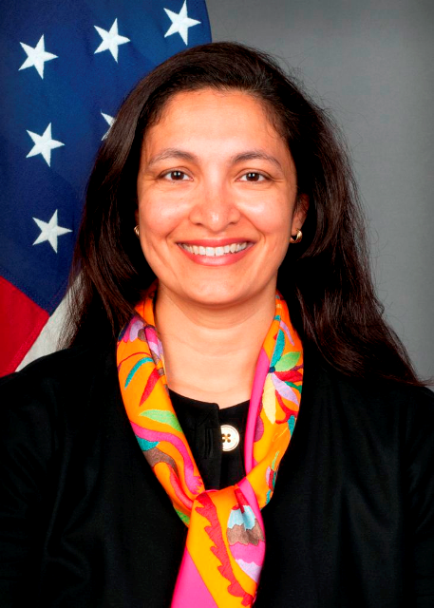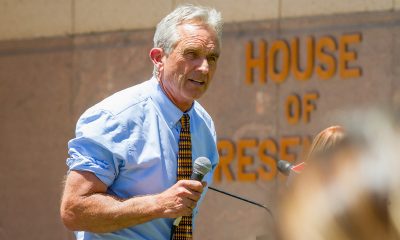World
State Department criticizes Russia over gay rights
Uzra Zeya spoke to Blade after John Kerry attended GLIFAA Pride event

A senior State Department official on Wednesday said the U.S. government has grown increasingly concerned about anti-LGBT discrimination and violence in Russia.
Uzra Zeya, acting assistant secretary of the Bureau of Democracy, Human Rights and Labor, spoke to the Washington Blade in an interview at her Foggy Bottom office hours after the Russian Duma unanimously approved a bill that would ban foreign same-sex couples and single people from nations that allow same-sex marriage from adopting Russian children. The U.S. LGBT group All Out earlier on Wednesday said authorities fined Coming Out St. Petersburg, a Russian LGBT advocacy group, 500,000 rubles ($15,000) under a “foreign agent” law the Kremlin is using to sue gay rights organizations.
The Russian Duma on June 11 passed a separate measure that would ban the “promotion of homosexuality” to minors.
The State Department in January criticized Russian lawmakers who supported the bill on its first reading.
“We are absolutely against any legislation that prohibits same-sex consensual relations and we speak out against it and so it’s a consistent position,” Zeya said. “We’re very concerned by the overall direction in Russia. It is something that we have communicated directly to the Russian government.”
Two men allegedly sodomized Vladislav Tornovoi with empty beer bottles and set his body on fire near Volgograd on May 10 after he reportedly came out to them as gay. Authorities on the Kamchatka Peninsula in Russia’s Far East said three men stabbed and trampled a gay man to death a few weeks later before they set his car on fire with his body inside.
Authorities on May 24 arrested Nikokai Alekseev, co-founder of Moscow Pride, and 29 other LGBT activists who tried to hold a Pride celebration outside Moscow City Hall. Police also arrested dozens of advocates who tried to stage a kiss-in outside the Duma before lawmakers approved the “promotion of homosexuality” to minors measure.
Zeya declined to say whether President Obama raised the issue with Russian President Vladimir Putin during their meeting on Monday at the annual G-8 summit that took place in Northern Ireland.
Zeya: State Department seeks to reach “directly at grassroots”
Then-Secretary of State Hillary Clinton in 2011 proclaimed “gay rights are human rights” during a landmark speech she gave in Geneva to commemorate International Human Rights Day. Obama on the same day issued a presidential memorandum that directed government agencies that implement American foreign policy to promote LGBT rights in the countries in which they work.
In addition to talking about Russia, Zeya noted to the Blade the Global Equality Fund — a public-private partnership that includes Finland, Iceland and the John Evans Foundation founded by C-SPAN co-founder John Evans — has spent more than $4 million in 25 countries since its 2011 inception to directly support activists and underrepresented groups. The USAID-backed LGBT Global Development Partnership with the Gay and Lesbian Victory Institute, the Swedish International Development Corporation Agency and other groups will contribute $11 million over the next four years to advocacy groups in Honduras and other developing countries.
30 Colombian LGBT rights activists attended the partnership’s first training that took place in Bogotá, Colombia, from May 29-June 2.
“It’s about reaching directly at the grassroots in the countries concerned,” Zeya said. “We still have a situation where nearly 80 countries have laws prohibiting or basically making homosexuality illegal. This is an uphill battle that we have to continue to fight and we’re looking to bring more partners in on this so you can’t say this is exclusively an American agenda or a U.S. government agenda, but in fact this is a common effort to support universal rights and equality.”
Zeya also spoke to the Blade immediately after Secretary of State John Kerry spoke at Gays and Lesbians In Foreign Affairs Agencies (GLIFAA)’s annual Pride event at which Georgia Congressman John Lewis and National Center for Transgender Equality Executive Director Mara Keisling spoke. Obama earlier in the day specifically mentioned gays and lesbians during a speech he delivered at the Brandenburg Gate in Berlin.
“It shows the president’s commitment to LGBT equality, but also that we view LGBT rights as just part of universal rights as the secretary (Kerry) said,” Zeya said. “We heard that in a very compelling and heartfelt way from Sec. Kerry that this has been a life-long commitment and he’s committed to this struggle. He recognizes how far we’ve come and in some ways how shocking some of the past sort of debate on this issue, but he’s totally committed to going forward so I think we have a real synergy between both the president and the secretary in determination to move ahead.”
European Union
Activists demand EU sanction Uganda over Anti-Homosexuality Act
Yoweri Museveni signed law on May 29, 2023

More than a dozen activists who protested in front of the European Union Delegation to the United States in D.C. on Thursday demanded the EU to sanction Uganda over the country’s Anti-Homosexuality Act.
Hillary Innocent Taylor Seguya, a Ugandan LGBTQ activist, and Global Black Gay Men Connect Executive Director Micheal Ighodaro are among those who spoke at the protest. Health GAP Executive Director Asia Russell also participated in the event that her organization organized along with GBGMC and Convening for Equality Uganda, a Ugandan LGBTQ rights group.
Ugandan President Yoweri Museveni last May signed the Anti-Homosexuality Act that, among other things, contains a death penalty provision for “aggravated homosexuality.”
The country’s Constitutional Court on April 3 refused to “nullify the Anti-Homosexuality Act in its totality.” A group of Ugandan LGBTQ activists have appealed the ruling.
A press release that Health GAP issued ahead of Thursday’s protest notes EU Commissioner for International Partnerships Jutta Urpilainen on March 6 announced more than €200 million ($212.87 million) for Uganda in support of “small business owners, young female entrepreneurs, agribusinesses as well as vital digital infrastructure projects in full Team Europe format with the European Investment Bank (EIB) and several member states.”
“These concrete initiatives will make a difference to aspiring entrepreneurs, Ugandan businesses and create jobs in multiple sectors,” said Urpilainen in a press release that announced the funds. “This is a perfect example of how Global Gateway can make a tangible difference for citizens and businesses and unlock the full potential of a partner country by working together.”
Convening for Equality Uganda on Tuesday in a letter they sent to Urpilainen asked the EU to review all funding to Uganda and “pause or reprogram any funds that go via government entities.” The protesters on Thursday also demanded European Commission President Ursula von der Leyen “to hold Ugandan President Museveni’s government accountable for this attack on human rights.”
Josep Borrell, the EU’s top diplomat, in a statement he released after Museveni signed the Anti-Homosexuality Act said the law “is contrary to international human rights law and to Uganda’s obligations under the African Charter on Human and People’s Rights, including commitments on dignity and nondiscrimination, and the prohibition of cruel, inhuman or degrading punishment.”
“The Ugandan government has an obligation to protect all of its citizens and uphold their basic rights,” said Borrell. “Failure to do so will undermine relationships with international partners.”
“The European Union will continue to engage with the Ugandan authorities and civil society to ensure that all individuals, regardless of their sexual orientation and gender identity, are treated equally, with dignity and respect,” he added.
Urpilainen last September in a letter to the European Parliament said the EU would not suspend aid to Uganda over the law.
India
Indian political parties for the first time include LGBTQ rights in election platforms
Voters will begin to cast ballots on April 19

The world’s largest democratic exercise will begin in India on April 19 as citizens begin to cast their votes in the country’s election.
This year’s election is different because national level political parties for the first time are promising to extend marriage rights to same-sex couples as part of their election platforms.
The Indian National Congress, one of India’s oldest political parties, promised after wide consultation that it would introduce a bill that would recognize civil unions between couples who are part of the LGBTQ community. The party, which has governed India for the majority of the period since independence from the U.K. in 1947, has refrained from taking a stance on laws that include Section 377, which criminalized consensual same-sex sexual relations.
Then-Health Minister Gulam Nabi Azad in 2011 when the INC was in power said homosexuality is a disease. He made the controversial comment while speaking at an HIV/AIDS conference in New Delhi, the Indian capital.
“Unfortunately, this disease has come to our country too,” said Azad. “Where a man has sex with another man, which is completely unnatural and should not happen but does.”
When the Delhi High Court was hearing the Naz Foundation case, the Home Affairs Ministry opposed the striking down of Section 377 based on its belief that homosexuality cannot be morally condoned. The INC never struck down Section 377, which criminalized homosexuality, in parliament.
A 5-judge panel on the Supreme Court on Sept. 6, 2018, decriminalized consensual same-sex sexual relations.
The Communist Party of India (Marxist) on April 4 unveiled its platform with a range of socialist commitments, including support for LGBTQ rights. Among these pledges is to amend the Transgender Persons (Protection of Rights) Act 2019 to address community concerns and ensure legal recognition and protection for same-sex couples akin to marriage.
The platform also outlined plans to introduce a bill similar to the Special Marriage Act of 1954, which allows partners to be listed as dependents and facilitating like inheritance, alimony in the event of divorce and other issues. The party further pledged to enact a comprehensive anti-discriminatory bill that would include LGBTQ people, ensure quotas in educational institutions and implement horizontal reservations in employment.
Addressing the issue of crimes against LGBTQ people, the platform promised to treat such offenses on par with crimes against heterosexuals. The platform also calls for tackling bullying, violence and harassment of gender non-conforming and LGBTQ people in educational settings, enforcing anti-hazing policies and combating hazing based on sexual orientation and gender identity.
The platform further touched issues related to transition and informed consent.
The Special Marriage Act of 1954 is a law that provides for civil unions among Indians and Indian nationals who live abroad, regardless of the religion or faith followed by either party. This law enables people from two different religious backgrounds to enter into marriage. Parliament in 2019 passed the Transgender Persons (Protection of Rights) Act that extended rights to trans people.
Brinda Karat, a former member of the Rajya Sabha, the upper house of the Indian Parliament, and leader of the Communist Party of India (Marxist), spoke with the Washington Blade and said the current government has homophobic ideas that are not acceptable to the party.
The ruling government under Prime Minister Narendra Modi is striving to secure more than 400 parliament seats in the upcoming election, aiming for a substantial majority.
Various polls conducted by Indian news organizations indicate a probable victory for the ruling Bharatiya Janata Party. In response to the BJP’s dominance, Congress and several national and regional parties have joined forces as the Indian National Developmental Inclusive Alliance.
This alliance comprises 26 opposition political parties. Despite its formation, however, there is no clear coalition strategy in place and only two parties have included LGBTQ-specific policies in their election platforms.
The Blade reached out to Congress’ spokesperson for comment, but has not received a response. The BJP also did not respond to a request for comment.
The party has yet to release its election platform.
Ankush Kumar is a reporter who has covered many stories for Washington and Los Angeles Blades from Iran, India and Singapore. He recently reported for the Daily Beast. He can be reached at [email protected]. He is on Twitter at @mohitkopinion.
Africa
Ugandan activists appeal ruling that upheld Anti-Homosexuality Act
Country’s Constitutional Court refused to ‘nullify’ law

Twenty-two LGBTQ activists in Uganda have appealed this month’s ruling that upheld the country’s Anti-Homosexuality Act.
The Constitutional Court on April 3 refused to “nullify the Anti-Homosexuality Act in its totality.”
President Yoweri Museveni last May signed the law, which contains a death penalty provision for “aggravated homosexuality.”
The U.S. subsequently imposed visa restrictions on Ugandan officials and removed the country from a program that allows sub-Saharan African countries to trade duty-free with the U.S. The World Bank Group also announced the suspension of new loans to Uganda.
Media reports indicate Sexual Minorities Uganda Executive Director Frank Mugisha and Jacqueline Kasha Nabagesara are among the activists who filed the appeal.
-

 Africa5 days ago
Africa5 days agoCongolese lawmaker introduces anti-homosexuality bill
-

 District of Columbia1 day ago
District of Columbia1 day agoReenactment of first gay rights picket at White House draws interest of tourists
-

 World5 days ago
World5 days agoOut in the World: LGBTQ news from Europe and Asia
-

 Arizona2 days ago
Arizona2 days agoAriz. governor vetoes anti-transgender, Ten Commandments bill













